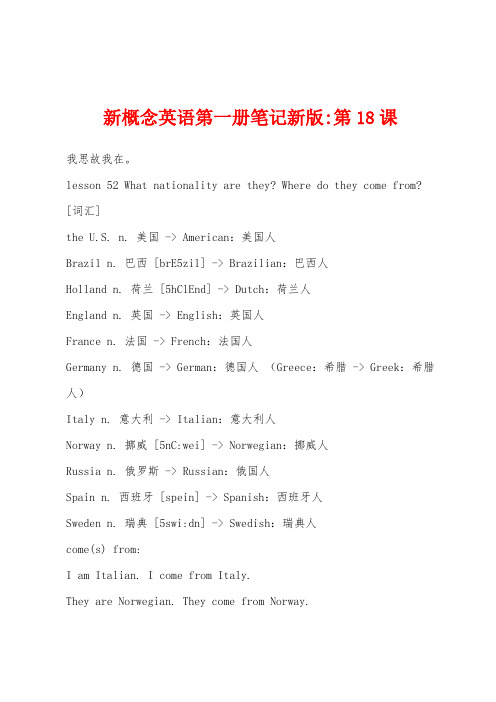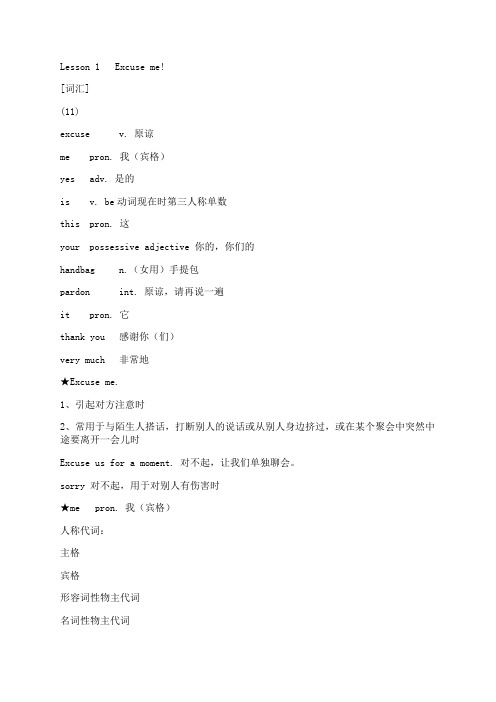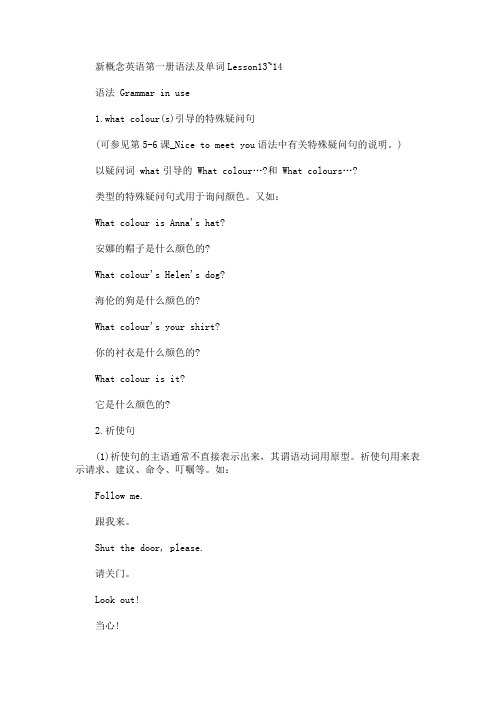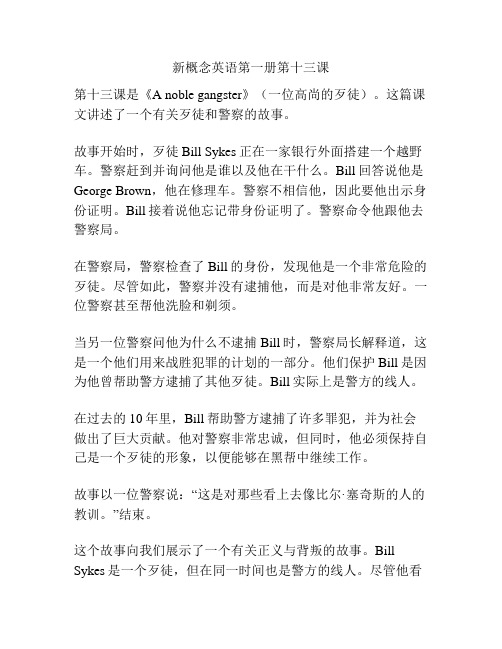新概念英语第一册课文注释Lesson13_18
新概念英语第一册笔记新版-第18课

新概念英语第一册笔记新版:第18课我思故我在。
lesson 52 What nationality are they? Where do they come from? [词汇]the U.S. n. 美国 -> American:美国人Brazil n. 巴西 [brE5zil] -> Brazilian:巴西人Holland n. 荷兰 [5hClEnd] -> Dutch:荷兰人England n. 英国 -> English:英国人France n. 法国 -> French:法国人Germany n. 德国 -> German:德国人(Greece:希腊 -> Greek:希腊人)Italy n. 意大利 -> Italian:意大利人Norway n. 挪威 [5nC:wei] -> Norwegian:挪威人Russia n. 俄罗斯 -> Russian:俄国人Spain n. 西班牙 [spein] -> Spanish:西班牙人Sweden n. 瑞典 [5swi:dn] -> Swedish:瑞典人come(s) from:I am Italian. I come from Italy.They are Norwegian. They come from Norway.My mother is Spanish. She comes from Spain.The girl is French. She comes from France.My wife is Brazilian. She comes from Brazil.You are German. You come from Germany.A Complete these sentence.Example:I come from England, but Stella comes from Spain.1 We come from Germany, but Dimitri comes from Greece.2 I like cold weather, but he likes warm weather.3 He comes from the U.S., but she comes from England.4 She doesn”t like the winter, but she likes the summer.5 I come from Norway, but you come from Spain.6 Stella comes from Spain, but Hans and Karl come from Germany.7 We don”t come from Spain. We come from Brazil.Lesson 53 An interesting climate[词汇]mild adj. 温柔的,暖和的 [maild]always adv. 总是north n. 北方east n. 东方wet adj. 潮湿的west n. 西方south n. 南方season n. 季节best adv. 最night n. 夜晚rise v. 升起early adv. 早set v. (太阳)落下去late adv. 晚,迟interesting adj. 好玩的,有意思的subject n. 话题;[语法]主语;科目conversation n. 谈话an interesting subject of the conversationin the westin the southEngland:英国(the Great Britain and Northern Ireland)cold front:冷锋warn front:暖峰Scotch whisky:苏格兰威士忌ScotlandEnglandWelshNorthern Irelandmild -> wild:野性的It”s mild.What the climate like in England?It”s very mild. But it”s not always pleasant. mild:(人)性格温柔的(与生俱来)gentleman:绅士gentle:温柔的,文静的(后天)in the north:在北方in the southwet:(程度) all in wetdamp:(外表不枯燥)humid:(专业)moist:(舒适的潮湿)It”s very wet.sea:大海son:儿子seasons [5si:znz]good 好better(比拟级)best(级)I like spring best.Do you like spring?Which season(s) do you like best?I like spring and summer best.Because the days are long and the nights are short.I don”t like autumn and winter.Because the days are short and the nights are long. The sun rises early/late and sets late/early. Which season do you like best?I like spring and summer best.Because the days are long and the nights are short. The sun rises early and sets late.I don”t like autumn and winter.Because the days are short and the nights are long. The sun rises late and sets early.at nightrises [raiziz]setsan interestingsubject n. 话题;[语法]主语;科目How many subjects do you have in your class?say:(说话的内容)speak:(讲话的动作)talk:(谈话,谈天)chat:(谈天)dialog:(对话—有固定的话题)conversation n. 谈话(随便的沟通)interesting subject of our conversationMoney and beauty are interesting subjects of conversation. favorite:特殊喜爱的人(或物)Climate is our favorite subject of conversation.[提示]in the WestIt”s wet in the West.in the NorthIt”s cold in the North.in the EastIt”s windy in the East.in the SouthIt”s warm in the South.What”s the climate like in England?It”s mild, but it”s not always pleasant.Which season does Jim like best?Spring and summer.Because the days are long and the nights are short. The sun rises early and sets late.Why doesn”t he like autumn and winter?Because the days are short and the night are long. The sun rises late and sets early.Is the climate in England very good?Climate in England is not very good.Is it very interesting?The climate in England is not very good.But it is very/certainly interesting.It”s wet in the West.It”s windy in the East.It”s cold in the North.It”s warm in the South.Jim comes from England.Jim likes spring and summer.Because the days are long and the nights are short.The sun rises early and sets late.He doesn”t like autumn and winter.Because the days are short and the nights are long.The sun rises late and sets early.The climate is the favorite subject of their conversation.[课文] Where do you come from?I come from England.What”s the climate like in your country?It”s mild, but it”s not always pleasant.The weather”s often cold in the North and windy in the East. It”s often wet in the West and sometimes warm in the south. Which seasons do you like best?I like spring and summer.The days are long and the night are short.The sun rises early and sets late.I don”t like autumn and winter.The days are short and the nights are long.The sun rises late and sets early.Our climate is not very good, but it”s certainly interesting. 确实It”s our favourite subject of conversation.[词汇·略]Lesson 54 What nationality are they? Where do they come from? [词汇]Australia n. 澳大利亚Australian n. 澳大利亚人Austria n. 奥地利Austrian n. 奥地利人Canada n. 加拿大Canadian n. 加拿大人China n. 中国 ChineseFinland n. 芬兰Finnish n. 芬兰人India n. 印度Indian n. 印度人Japan n. 日本 JapaneseNigeria n. 尼日利亚 [nai5dViEriE] Nigerian n. 尼日利亚人Turkey n. 土耳其 [5tE:ki]Turkish n. 土耳其人Korea n. 韩国Polish n. 波兰人Poland n. 波兰Thai n. 泰国人Thailand n. 泰国A Write questions and answers Example:The sun rises early.Does the sun rise early?The sun doesn”t rise early.1 The sun sets late.Does the sun set late?The sun doesn”t set late.2 He likes ice cream.Does he like ice cream?He doesn”t like ice cream.3 Mrs. Jones wants a biscuit.Does Mrs. Jones want a biscuit?Mrs. Jones doesn”t want a biscuit.4 Jim comes from England.Does Jim come from England?Jim doesn”t come from England.B Write questions and answers using these words. Example:he/BrazilWhere does he come from? Is he Brazilian?Yes, he”s Brazilian. He comes from Brazil.1 he/AustraliaWhere does he come from? Is he Australian? Yes, he”s Australian. He comes from Australia.3 she/CanadaWhere does she come from? Is she Canadian? Yes, she”s Canadian. She comes from Canada.4 this girl/FinlandWhere does this girl come from? Is she Finland?Yes, she”s Finnish. She comes from Finland.5 they/IndiaWhere do they come from? Are they Indian?Yes, they”re Indian. They come from India.7 Naoko/JapanWhere does Naoko come from? Is she Japanese? Yes, she”s Japanese. She comes from Japan.8 my wife/NigeriaWhere does your wife come from? Is she Nigerian? Yes, she”s Nigerian. She comes from Nigeria.10 he/KoreaWhere does he come from? Is he Korean?Yes, he”s Korean. He comes from Korea.she/ThailandWhere does she come from? Is she Thai?Yes, she”s Thai. She comes from Thailand.。
新概念第一册词汇语法第13课:Anewdress一件新连衣裙

Lesson 13 A new dress⼀件新连⾐裙LOUISE: What colour's your new dress?ANNA: It's green.ANNA: Come upstairs and see it.LOUISE: Thank you.ANNA: Look!Here it is!LOUISE: That's nice dress.It's very smart.ANNA: My hat's new, too.LOUISE: What colour is it?ANNA: It's the same colour.It's green, too.LOUISE: That is a lovely hat!路易丝:你的新边⾐裙是什么颜⾊的?安娜:是绿⾊的。
安娜:到楼上来看看吧。
路易丝:谢谢。
安娜:瞧,就是这件。
路易丝:这件连⾐裙真好,真漂亮。
安娜:我的帽⼦也是新的。
路易丝:是什么颜⾊的?安娜:⼀样的颜⾊,也是绿的。
路易丝:真是⼀顶可爱的帽⼦!1.It's the same colour.⼀样的颜⾊。
same 通常与定冠词the连⽤,表⽰“同⼀的”、“相同的”:two boys of the same age 两个同龄的男孩⼦We live in the same city.我们住在同⼀个城市⾥。
2.That is a lovely hat!真是⼀顶可爱的帽⼦!句末⽤的是惊叹号,表现出较强的感情⾊彩。
句中的 is ⽤斜体,是为了强调,应重读。
3.数字 40,50,60,70,80,90,100,101的英⽂写法40—forty 50—fifty 60—sixty70—seventy 80—eighty 90—ninety100—a hundred 101—a hundred and one语法 Grammar in use1.what colour(s)引导的特殊疑问句(可参见 Lessons 5~6语法中有关特殊疑问句的说明。
新概念英语第一册Lesson13~18课文翻译及学习笔记(最新)

新概念英语第一册Lesson13~14课文翻译及学习笔记【课文】LOUISE: What colour's your new dress? ANNA: It's green.ANNA: Come upstairs and see it.LOUISE: Thank you.ANNA: Look!Here it is!LOUISE: That's a nice dress.It's very smart.ANNA: My hat's new, too.LOUISE: What colour is it?ANNA: It's the same colour.It's green, too.LOUISE: That is a lovely hat!【课文翻译】路易丝:你的新衣裙是什么颜色的?安娜:是绿色的。
安娜:到楼上来看看吧。
路易丝:谢谢。
安娜:瞧,就是这件。
路易丝:这件连衣裙真好,真漂亮。
安娜:我的帽子也是新的。
路易丝:是什么颜色的?安娜:一样的颜色,也是绿的。
路易丝:真是一顶可爱的帽子!【生词】colour n. 颜色green adj. 绿色come v. 来upstairs adv. 楼上smart adj. 时髦的,巧妙的hat n. 帽子same adj. 相同的lovely adj. 可爱的,秀丽的【知识点讲解】1. 在上一课,我们已经为大家补充了很多种颜色的说法,今天这一课以及其后的练习课14课中,我们还将学到一些新的颜色:比如grey,灰色的;brown,棕色的,等等。
2. 今天我们还学习了一些形容词,比如new,nice,lovely和smart。
形容词一般用在名词前面。
这里的smart 除了课文中“时髦、巧妙”的意思之外,还可以用来形容头脑聪明。
3. what color's...等于what color is,是一种缩写。
新概念英语1册 课文 完整版

Lesson 1 Excuse meexcuse v. 原谅me pron. 我(宾格)yes adv. 是的is v. be动词现在时第三人称单数this pron. 这your possessive adjective 你的,你们的handbag n.(女用)手提包pardon int. 原谅,请再说一遍it pron. 它thank you 感谢你(们)very much 非常地★Excuse me.1、引起对方注意时2、常用于与陌生人搭话,打断别人的说话或从别人身边挤过,或在某个聚会中突然中途要离开一会儿时Excuse us for a moment. 对不起,让我们单独聊会。
sorry 对不起,用于对别人有伤害时★me pron. 我(宾格)人称代词:主格宾格形容词性物主代词名词性物主代词Imemyminehehimhishissheherherhersitititsitsyouyouyouryours主格:用在句首,作主语宾格:在动词、介词之后形容词性的物主代词:不能单独使用名词性物主代词:只能单独使用★is v. be动词现在时第三人称单数be动词:am、is、areI amshe/ he/ it isyou/ we/ they are★pardon int. 原谅,请再说一遍Pardon?/ I beg your pardon. 请求对方把刚才讲过的话重复一遍。
[语法]含有be动词的陈述句、否定句和一般疑问句含有be动词的任何句子,否定句就是在be动词后面加not;如果变一般疑问句,就把be动词提前到句子的前面。
[课文]Excuse me.Yes?Is this your handbag?Pardon?Is this your handbag?Yes, it is.Thank you very much.Lesson 2 Is this your…?[词汇](10)pen n.钢笔pencil n.铅笔book n.书watch n.手表coat n.上衣,外衣dress n.连衣裙skirt n.裙子shirt n.衬衣car n.小汽车house n.房子★dress① n. 连衣裙;套裙② n. 服装,衣服casual dress 便服evening dress 晚礼服★house n.房子house 房子,一般指独立的院落,更具体的指房子的建筑,结构family 侧重家庭的成员There are four people in my family. 在我家里有四口人。
新概念英语第一册课文注释Lesson13~18

【导语】新概念英语之所以经久不衰是因为以其全新的教学理念,有趣的课⽂内容和全⾯的技能训练,为英语学习者排忧解难,深受⼴⼤英语学习者的欢迎和喜爱。
想要学好英语的你,怎能错过?快来加⼊学习吧!为您提供了以下内容,希望能够为⼤家学习新概念英语提供帮助!新概念英语第⼀册课⽂注释Lesson13~14 1.It's the same colour.⼀样的颜⾊。
same 通常与定冠词the连⽤,表⽰"同⼀的"、"相同的": two boys of the same age 两个同龄的男孩⼦ We live in the same city. 我们住在同⼀个城市⾥。
2.That is a lovely hat!真是⼀顶可爱的帽⼦! 句末⽤的是惊叹号,表现出较强的感情⾊彩。
句中的 is ⽤斜体,是为了强调,应重读。
3.数字 40,50,60,70,80,90,100,101的英⽂写法 40-forty 50-fifty 60-sixty 70-seventy 80-eighty 90-ninety 100-a hundred 101-a hundred and one新概念英语第⼀册课⽂注释Lesson15~16 1.Your passports,please.请出⽰你们的护照。
请参见第3-4课_Sorry,sir.课⽂详注。
2.Here they are.给您。
本句中的 they指 passports。
请参见第11-12课_Is this your shirt?课⽂详注。
3.名词的复数形式(1) 英语中可数名词有单数和复数两种形式,指⼀个以上的事物时⽤复数形式。
可数名词的复数形式⼀般是在单数名词后⾯加上-s,如课⽂中的friend- friends,tourist-tourists,case-cases。
请注意-s的不同发⾳。
如果名词是以-s结尾的,变成复数时则要加-es,如dress-dresses,blouse- blouses。
新概念第一册 13课笔记

新概念第一册13课笔记
1. What colour is …? …是什么颜色的?
It is + 颜色.
Eg: What colour is your dress?
It is yellow.
当询问的东西是复数时,is 改成are
What colour are your shoes?
They are+ 颜色.
colour=color 颜色
2. 祈使句
表示命令,叮嘱,请求的句子叫做祈使句。
通常省略主语,以动词直接开头。
否定形式,直接加don’t Come in. 否定:Don’t come in.
Sit down. 否定:Don’t sit down.
Go out! 否定:don’t go out.
Stand up. 否定:Don’t stand up.
3. Come and do... 过来做...... (and表示目的=to)
Come and look at the picture.
Come and sit.
4. Here it is. (倒装结构)
正常结构:It is here.
5. same
same 常与定冠词the连用,表示相同的
We have the same book.
6. 名词所有格变化2:
当名词以“S” 结尾时,只需要在“S” 的后面加撇“ ’”
①不以“S”结尾,加’S
Tim car →Tim’s car
②以S结尾,所以直接加’
James house →James’ house
Hans shirt →Hans’ shirt。
新概念英语第一册Lesson13~18重要句型

新概念英语第一册Lesson13~18重要句型【导语】为了方便同学们的学习,为您精心整理了“新概念英语第一册Lesson13~18重要句型”,希望有了这些内容的帮助,可以为大家学习新概念英语提供帮助!如果您想要了解更多新概念英语的相关内容,就请关注吧!新概念英语第一册Lesson13~14重要句型一、重要句型或语法what colour1) What colour’s your new dress? It’s green.2) What colur is it? It’s the same colour. It’s green, too.二、课文主要语言点What colour’s your new dress? 可从what的用法角度,复习一下之前学过的What’s your name?/What’s your job?/What nationality are you?/What make is it?。
其中,What’s your job?有What are you?或What do you do?的不同问法。
What nationality are you?有Where do you come from?和Where are you from?的不同问法。
注意:colour 存在英、美语的拼写差异,美语里会拼成color——英式英语里的-our音节,到了美语里,经常拼作-or。
green 绿色。
有时用作引申义,如a green thumb,表示“擅长园艺的人”;a green hand,表示“新手,生手”。
Come upstairs and see it. 该句为祈使句,可提示学生到了第29-30课会重点学习祈使句,但在本课不宜做拓展。
upstairs可从构词法角度,告诉学生该词是由up和stairs 构成;可引出downstairs,作对比。
Here it is! 就是这件。
主要用来提示前面提到的事物,注意与“Here you are.”的区别。
新概念英语第一册语法综述 13-18

新概念英语第一册语法综述(LESSON13-LESSON18)Part 11、Your passports, please. 最简单的祈使句,参见Lesson1的语法。
1.表示请求、要求、命令、建议等意义的句子称为祈使句。
祈使句肯定结构中的谓语动词一律用动词原形,句子以谓语(动词原形)开头,句末用惊叹号或句号,句子用降调。
2.祈使句变否定形式是在祈使句的开头加“Don`t”3.祈使句的句前或句末常常加上please,以使语气更加缓和、客气。
2、Here they are. 给你。
这是Here it is.复数形式。
参见Lesson1的语法。
3、How do you do? 你好。
用于较正式的场合。
等于Nice to meet you. 参见Lesson1的语法。
4、Come and meet our employees… and引导的第二个祈使动词,参见Lesson4的语法。
5、office assistant = office boy。
办公室的干杂务的工作人员。
6、复数形式:1.代词的复数形式:we(I);you(you);he/she/it(they);my(our);your(your);his/her/its(their);this(these);that(those)2.现在时中,动词be使用are3.名词的复数:名词分两种,可数名词和不可数名词。
一般来说:专有名词、物质名词和抽象名词是不可数名词。
反之就是可数名词。
一些不可数名词的例子如:bread、pork、water、money、air、paper、glass。
一般来说,如果名词单独跟数词产生数量上歧义就是不可数名词,比如:Give me two pork 不能表达出名词的准确数量,这就是不可数名词。
可数名词的复数变化:(1) 一般情况下加-s,如:book-books friend-friends case-cases(2) 以-s,-x,-ch,-sh加-es,如:dress-dresses box-boxes watch-watches dish-dishes(3) 以-f或-fe结尾的,把f或fe变v再加-es,如:leaf-leaves life-lives knife-knives但也有例外情况:roof-roofs chief-chiefs gulf-gulfs serf-serfs belief-belief-s proof-proofs(4) 以“辅音+y”结尾的,把y变i再加es,但“元音+y”只加s,如:factory-factories boy-boys(5) 有些以“辅音+o”结尾的加es,常用的单词只有四个:Negro-Negroes hero-heroes potato-potatoes tomato-tomatoes(6) 不规则变化:1)特殊变化:foot-feet mouse-mice child-children man-men2)单复数相同:a sheep-two sheep a fish- two fish3)只有复数glasses 眼镜;compasses 圆规goods 货物trousers 裤子4)复数常用:常使用复数,如果使用单数表示其中之一。
新概念第一册课文和翻译

课文1 对不起!1. Excuse me!对不起2. Yes?什么事?3. Is this your handbag?这是您的手提包吗?4. Pardon?对不起,请再说一遍。
5. Is this your handbag?这是您的手提包吗?6. Yes, it is.是的,是我的。
7. Thank you very much.非常感谢!课文3 对不起,先生。
8. My coat and my umbrella please.请把我的大衣和伞拿给我。
9. Here is my ticket.这是我(寄存东西)的牌子。
10. Thank you, sir.谢谢,先生。
11. Number five.是5号。
12. Here's your umbrella and your coat.这是您的伞和大衣13. This is not my umbrella.这不是我的伞。
14. Sorry sir.对不起,先生。
15. Is this your umbrella?这把伞是您的吗?16. No, it isn't.不,不是!17. Is this it?这把是吗?18. Yes, it is.是,是这把19. Thank you very much.非常感谢。
课文5 很高兴见到你。
20. Good morning.早上好。
21. Good morning, Mr. Blake.早上好,布莱克先生。
22. This is Miss Sophie Dupont.这位是索菲娅.杜邦小姐。
23. Sophie is a new student.索菲娅是个新学生。
24. She is French.她是法国人。
25. Sophie, this is Hans.索菲娅,这位是汉斯。
26. He is German.他是德国人。
27. Nice to meet you.很高兴见到你。
28. And this is Naoko.这位是直子。
2020最新新概念英语第一册语法及单词Lesson13~18

新概念英语第一册语法及单词Lesson13~14语法 Grammar in use1.what colour(s)引导的特殊疑问句(可参见第5-6课_Nice to meet you语法中有关特殊疑问句的说明。
)以疑问词 what引导的What colour…?和What colours…?类型的特殊疑问句式用于询问颜色。
又如:What colour is Anna's hat?安娜的帽子是什么颜色的?What colour's Helen's dog?海伦的狗是什么颜色的?What colour's your shirt?你的衬衣是什么颜色的?What colour is it?它是什么颜色的?2.祈使句(1)祈使句的主语通常不直接表示出来,其谓语动词用原型。
祈使句用来表示请求、建议、命令、叮嘱等。
如:Follow me.跟我来。
Shut the door, please.请关门。
Look out!当心!Keep off the grass!请勿践踏草地!Help yourself.请自己动手。
(2)某些祈使动词可以后跟and和另一个祈使动词,而不是后跟人们预料的带to的动词不定式结构:Come and see this goldfish.来看这条金鱼。
(不用 Come to see)Go and buy yourself a new pair of shoes.去给自己买双新鞋吧。
(不用 Go to buy)Wait and see.等着瞧吧。
(不用 Wait to see)词汇学习 Word study1.nice adj.(1)美好的,好看的:It's a nice day today, isn't it?今天天气真好,不是吗?That's a nice dress.那件连衣裙真好看。
(2)和蔼的,友好的:He is very nice to his neighbours.他对邻居很友善。
新概念英语第一册课文翻译及学习笔记Lesson133~138

【导语】为了⽅便同学们的学习,为您精⼼整理了“新概念英语第⼀册课⽂翻译及学习笔记Lesson133~138”,希望有了这些内容的帮助,可以为⼤家学习新概念英语提供帮助!如果您想要了解更多新概念英语的相关内容,就请关注吧!新概念英语第⼀册课⽂翻译及学习笔记Lesson133~134 【课⽂】 Reporter: Have you just made a new film, Miss Marsh? Miss Marsh: Yes, I have. Reporter: Are you going to make another? Miss Marsh: No, I'm not. I'm going to retire. I feel very tired. I don't want to make another film for a long time. Kate: let's buy a newspaper, Liz. Listen to this! "Karen Marsh: Sensational News! By our reporter, Alan Jones. Karen Marsh arrived at London Airport today. She was wearing a blue dress and a mink coat. She told me she had just made a new film. She said she was not going to make another. She said she was going to retire. She told reporters she felt very tired and didn't want to make another film for a long time." Liz: I wonder why! 【课⽂翻译】 记者:您刚拍完⼀部新电影吗,马什⼩姐? 马什⼩姐:是的,我刚拍完。
新版新概念英语第一册第13课课堂笔记

新版新概念英语第一册第13课课堂笔记开场白money/ man/ woman/ life一个故事The list of life 生命的清单be afraid of v. 害怕,担忧discuss 讨论travel v. 旅行,传播make a list of the rest of his lifealong prep. 顺着,沿着quit/ give up his job 辞职article 文章If not because of the sickness, I'll never realize how terrible my life was before.life is going on as it should be.Everybody has a date a cancer, that is inevitable death.Every life has its actual blanks, which ideal must fill up.Lesson 36 Where…?……在哪里?[词汇]beside prep. 在……旁off prep. 离开Exercise Bboy swimming/ across the riverWhere is the boy swimming? He's swimming across the river.children going/ into the parkWhere are the children going? They're going into the park.1 man going/ into the shopWhere is the man going? He's going into the shop.2 woman going/ out of the shopWhere is the woman going? She's going out of the shop.3 he sitting/ beside his motherWhere is he sitting? He's sitting beside his mother.4 they walking/ across the streetWhere are they walking? They're walking across the street.5 the cats running/ along the wallWhere are the cats running? They're running along the wall.6 the children jumping/ off the branchWhere are the children jumping? They're jumping off the branch.7 man standing/ between two policemen.Where is the man standing? He is standing between two policemen.8 she sitting/ near the treeWhere is she sitting? She is sitting near the tree.9 it flying/under the bridgeWhere is it flying? It is flying under the bridge.10 the aeroplane flying/ over the bridgeWhere is the aeroplane flying? It is flying over the bridge.11 they sitting/ on the grassWhere are they sitting? They are sitting on the grass.12 the man and the woman reading/ in the living roomWhere are the man and the woman reading? They are reading in the living room.Lesson 37 Making a bookcase 做书架[词汇]work v. 工作hard adv. 努力地make v. 做bookcase n. 书橱,书架hammer n. 锤子paint v. 上漆,涂pink n.& adj. 粉红色favourite adj. 最喜欢的work [wE:k] [wEk]work/ job/ task/ employment/ labour/ occupation/ professionemploy v.employee 雇员/ employer 雇主professor 教授work hard/ hard work/ hard-workingGeorge is working hard./They are working hard.现在实行时的三种含义:1 现阶段正在实行的动作或状态2 现阶段正在实行,但说话的当时并不一定在实行的动作3 句子后加将来的时间,表示打算要做的事情be going to 句型。
新概念英语第一册:第13-18课核心词汇

【导语】新概念英语作为家喻户晓的英⽂学习教材,《新概念英语》在中国经久不衰,影响了好⼏代学习者。
即使以今天的⾓度来看,这套出版于⼏⼗年前的教材⽆论是在编排体系,题材和题材,词汇还是语法上都有出彩之处,值得各个层次的⼈学习。
⽆忧考为您整理了以下内容,仅供参考。
希望可以帮助到您!如果您想要了解更多相关内容,欢迎关注⽆忧考!【篇⼀】13-14课核⼼词汇 colour 颜⾊ green 绿⾊ come 来 upstairs 楼上 look 看 smart 漂亮的 hat 帽⼦ same 同样的 lovely 可爱的 case 箱⼦ carpet 地毯 dog 狗 black ⿊⾊的 grey 灰⾊的 brown 褐⾊的 red 红⾊的 orange 橙⾊的 yellow 黄⾊的 thirty 三⼗ forty 四⼗ fifty 五⼗ sixty 六⼗ seventy 七⼗ eighty ⼋⼗ ninety 九⼗ one hundred ⼀百 one hundred and one ⼀百零⼀【篇⼆】15-16课核⼼词汇 we 我们 customs 海关 officer 官员 girl ⼥孩 Danish 丹麦⼈ friend 朋友 Norwegian 挪威⼈ passport 护照 they 他们 tourist 游客 Russian 俄罗斯⼈ Dutch 荷兰⼈ these 这些 one hundred and two ⼀百零⼆ one hundred and ten ⼀百⼀⼗【篇三】17-18课核⼼词汇 our 我们的 employee 雇员 those 那些 hard-working 勤奋的 sale 销售 rep 代表 assistant 助⼿ two hundred 两百 nine hundred 九百 one thousand ⼀千 one thousand and one ⼀千零⼀ one thousand and five ⼀千零五。
新概念第一册L13-18

1. 2. 3.is young man is very hardworking. 你们是来旅游的吗?是的,我们是来旅游的。 Are you tourists? Yes, we are. 请出示你的护照。 Your passport, please. 她们是女警察。 They are policewomen. 你们的小狗是什么颜色的?我们的小狗是白色的。 What color is your dog? Our dog is white. 上楼来看一下吧。 Come upstairs and see it. 他们的工作是什么? What are their jobs?
批注本地保存成功开通会员云端永久保存去开通
将下列单数句子变成复数
• • • • • • • • 1. This man is very busy. 2. Is that coat blue? 3. I am a Chinese girl. 4. Who is this little boy? 5. He is a taxi driver. 6. Is she a housewife? 7. She is an airhostess. 8. That young man is a postman. • 9. This is my dress. • 10. What’s his job? 1. These men are very busy. 2. Are those coats blue? 3. We are Chinese girls. 4. Who are these little boys? 5. They are taxi drivers. 6. Are they housewives? 7. They are airhostess. 8. Those young men are postmen. 9. These are my dresses. 10. What are their jobs?
新概念英语第一册Lesson137138Apleasantdream小学英语初中英语全国通用

B. He will buy his wife a football. D. He will buy his wife the world.
查看答案解析
答案:He will buy his wife a mink coat.; 解析: 根据本课所学对话内容 "If I win a lot of money I'll buy you a mink coat. "可知 , 如杲Brian赢得很 多钱 , 他将给他妻子 买一件貂皮大衣 , 所以 , 本题答案应为He will buy his wife a mink coat. ;
Vocabulary
词汇精讲
football world win
depend poor
同学们 , 请对照表格 , 朗读一下学过的单词。
做个小练习 巩固一下吧~
Children ______ on their parents for food and clothing.
A. spend C. depend
Language Point
语句讲解、课文讲解
home : adv. 副词
return back home / return back to home (×) return home : 回家
Language Point
语句讲解、课文讲解
同学们 , 请对照教材听老师讲解!
④ But if we... , we'll... What'II we do then? ⑤ If we... we'll...
上一题
Language Point
语句讲解、课文讲解
同学们 , 请对照教材听老师讲解!
① What will you do if…
新概念英语第一册第十三课

新概念英语第一册第十三课
第十三课是《A noble gangster》(一位高尚的歹徒)。
这篇课文讲述了一个有关歹徒和警察的故事。
故事开始时,歹徒Bill Sykes正在一家银行外面搭建一个越野车。
警察赶到并询问他是谁以及他在干什么。
Bill回答说他是George Brown,他在修理车。
警察不相信他,因此要他出示身份证明。
Bill接着说他忘记带身份证明了。
警察命令他跟他去警察局。
在警察局,警察检查了Bill的身份,发现他是一个非常危险的歹徒。
尽管如此,警察并没有逮捕他,而是对他非常友好。
一位警察甚至帮他洗脸和剃须。
当另一位警察问他为什么不逮捕Bill时,警察局长解释道,这是一个他们用来战胜犯罪的计划的一部分。
他们保护Bill是因为他曾帮助警方逮捕了其他歹徒。
Bill实际上是警方的线人。
在过去的10年里,Bill帮助警方逮捕了许多罪犯,并为社会做出了巨大贡献。
他对警察非常忠诚,但同时,他必须保持自己是一个歹徒的形象,以便能够在黑帮中继续工作。
故事以一位警察说:“这是对那些看上去像比尔·塞奇斯的人的教训。
”结束。
这个故事向我们展示了一个有关正义与背叛的故事。
Bill Sykes是一个歹徒,但在同一时间也是警方的线人。
尽管他看
起来像一个危险的罪犯,但他实际上是一位高尚的人,为捉拿其他罪犯做出了巨大贡献。
这个故事强调了人们不能仅根据表面的外貌或行为来判断一个人的性格和目的。
- 1、下载文档前请自行甄别文档内容的完整性,平台不提供额外的编辑、内容补充、找答案等附加服务。
- 2、"仅部分预览"的文档,不可在线预览部分如存在完整性等问题,可反馈申请退款(可完整预览的文档不适用该条件!)。
- 3、如文档侵犯您的权益,请联系客服反馈,我们会尽快为您处理(人工客服工作时间:9:00-18:30)。
新概念英语第一册课文注释Lesson13~18
新概念英语第一册课文注释Lesson13~14
1.It's the same colour.一样的颜色。
same 通常与定冠词the连用,表示"同一的"、"相同的":
two boys of the same age 两个同龄的男孩子
We live in the same city.
我们住在同一个城市里。
2.That is a lovely hat!真是一顶可爱的帽子!
句末用的是惊叹号,表现出较强的感情色彩。
句中的 is 用斜体,是为了强调,应重读。
3.数字 40,50,60,70,80,90,100,101的英文写法
40-forty 50-fifty 60-sixty
70-seventy 80-eighty 90-ninety
100-a hundred 101-a hundred and one
新概念英语第一册课文注释Lesson15~16
1.Your passports,please.请出示你们的护照。
请参见第3-4课_Sorry,sir.课文详注。
2.Here they are.给您。
本句中的 they指 passports。
请参见第11-12课_Is this your shirt?课文详注。
3.名词的复数形式(1)
英语中可数名词有单数和复数两种形式,指一个以上的事物时用复数形式。
可数名词的复数形式一般是在单数名词后面加上-s,如课文中的friend- friends,tourist-tourists,case-cases。
请注意-s的不同发音。
如果名词是以-s结尾的,变成复数时则要加-es,如dress-dresses,blouse- blouses。
新概念英语第一册课文注释Lesson17~18
1.How do you do?您好。
这是用于第一次见面时的较正式用语。
一般用同样的话来回答。
请参见第5-6课
_Nice to meet you课文详注。
e and meet our employees…来见见我们的雇员……
这里的and表示目的。
请参见第13-14课_A new dress中语法部分的解释。
3.This is Nicola Grey,and this is Claire Taylor.这位是尼古拉·格雷,这位是克莱尔·泰勒。
这是介绍人们彼此认识时的常用句型。
请参见第5-6课_Nice to meet you课文详注。
4.名词的复数形式(2)
如果名词单数词尾为-f或-fe(读作/f/),则其复数一律变为-ves (读作/vz/),即将-f或-fe 变成-v,再加-es而成,如 housewife----housewives。
英语中有一些名词的复数形式是不规则的,如man与woman其复数形式分别为men 与women。
此外还可用man,woman等来区别阳性与阴性:以-man结尾的一些复合名词指男性,如milkman---- milkmen,policeman ---- policemen;一些以-woman结尾的名词指女性,如postwoman---- postwomen,policewoman ---- policewomen。
5.数字200,1000,1001的英文写法
200 ---- two hundred
1000 ---- a(或 one) thousand 1001 ---- a thousand and one。
